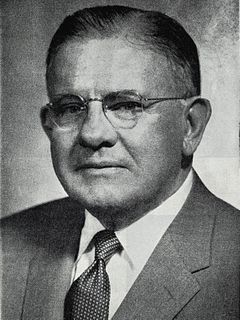A Quote by Henry D. Moyle
Charity is not a virtue to expect in others only. It is the all-important Christian attribute to be found in ourselves. . . . We believe that charity must begin at home. Can we hope to be charitable to the stranger if love does not abound in the family? A sure step in the direction of improvement and progress in our own lives comes when we share with mother or father in their dependence as they shared with us in their productive years.... We cannot as children ignore our obligations to our parents by passing responsibility for their care to others. . . .
Quote Topics
Abound
Attribute
Begin
Believe
Cannot
Care
Charitable
Charity
Children
Christian
Dependence
Direction
Does
Expect
Family
Father
Found
Home
Hope
Ignore
Important
Improvement
Lives
Love
Mother
Must
Obligations
Only
Others
Our
Ourselves
Own
Parents
Passing
Productive
Progress
Responsibility
Share
Shared
Step
Stranger
Sure
Us
Virtue
We Cannot
Years
Related Quotes
When we want to help the poor, we usually offer them charity. Most often we use charity to avoid recognizing the problem and finding the solution for it. Charity becomes a way to shrug off our responsibility. But charity is no solution to poverty. Charity only perpetuates poverty by taking the initiative away from the poor. Charity allows us to go ahead with our own lives without worrying about the lives of the poor. Charity appeases our consciences.
Hope is critical to both faith and charity. When disobedience, disappointment, and procrastination erode faith, hope is there to uphold our faith. When frustration and impatience challenge charity, hope braces our resolve and urges us to care for our fellowmen even without expectation of reward. The brighter our hope, the greater our faith. The stronger our hope, the purer our charity.
As disciples of Christ, we need to feel genuine charity for one another. As we do, new light will come into our own lives. This charity is essential in missionary work, but we must never allow ourselves to treat our neighbors only as potential converts. We have had the sad experience of seeing members of the Church who attempted to convert their neighbors and friends and, when they did not respond, withdrew their friendship and neighborliness. We must not be so anxious to share the gospel that we become insensitive to the feelings of others.
Emotional dependence is the opposite of emotional strength. It means needing to have others to survive, wanting others to "do it for us," and depending on others to give us our self-image, make our decisions, and take care of us financially. When we are emotionally dependent, we look to others for our happiness, our concept of "self," and our emotional well-being. Such vulnerability necessitates a search for and dependence on outer support for a sense of our own worth.
The other part of the true religion is our duty to man. We must love our neighbour as our selves, we must be charitable to all men for charity is the greatest of graces, greater then even faith or hope & covers a multitude of sins. We must be righteous & do to all men as we would they should do to us.
We have a stewardship responsibility to keep ourselves healthy physically and emotionally. If we don't, we cannot carry out our obligations to God, to family, to our employer, or to others. With this in mind, we put limits on the extent to which we allow others to abuse us. Doing right will mean abuse part of the time; that goes with the turf. But inviting abuse or failing to deal with it is wrong.
Pleasure cannot be shared; like Pain, it can only be experienced or inflicted, and when we give Pleasure to our Lovers or bestow Charity upon the Needy, we do so, not to gratify the object of our Benevolence, but only ourselves. For the Truth is that we are kind for the same reason as we are cruel, in order that we may enhance the sense of our own Power.
God is good. He is eager to forgive. He wants us to perfect ourselves and maintain control of ourselves. He does not want Satan and others to control our lives. We must learn that keeping our Heavenly Father's commandments represents the only path to total control of ourselves, the only way to find joy, truth, and fulfillment in this life and in eternity.
Peace is not just the absence of war, it is the active presence of a capacity for love and compassion, and reciprocity. It is an awareness that our lives are not to be lived simply for ourselves through expressing our individuality, but we confirm the purpose of our lives through the work of expressing our shared sense of community in a purposeful and practical way; to sustain our own lives we sustain the lives of others - in family, in a community of neighborhoods called a city, and in a community of nations called the world.
































